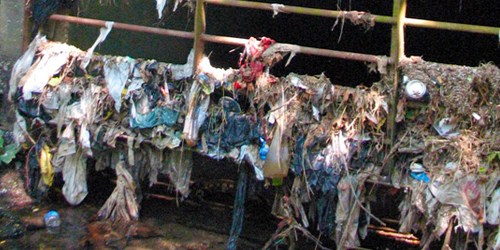Purpose of the Law
In 2008, the Department of Energy and Environment (DOEE) commissioned a systematic assessment of the types and sources of trash in the Anacostia River. The resulting study, performed by the Anacostia Watershed Society, determined that disposable plastic bags were one of the most prevalent types of trash pollution in the Anacostia River.
The District’s Anacostia River Clean Up and Protection Act of 2009 – commonly known as the “bag law” – took effect on September 23rd, 2009 and the associated fees for bag usage began on January 1st, 2010. The law, which is the first of its kind in the nation, requires District businesses that sell food or alcohol to charge a $0.05 fee for each paper and plastic bag distributed with any purchase, with certain exemptions. The primary goal of the bag law is to change consumer behavior by discouraging use of disposable bags, thereby reducing trash pollution in the District’s waterways. 
Bag fee revenue is deposited into the Anacostia River Clean Up and Protection Fund, a special-purpose fund managed by DOEE. The sole purpose of the fund is to support watershed protection initiatives, including education programs, stream restoration efforts, trash capture projects, and community outreach including the distribution of reusable bags. District residents can support the fund by making a voluntary contribution to the fund on their income tax return or by registering for an Anacostia River commemorative license plate.
Impact of the Law
The five-cent fee on disposable bags has resulted in a drastic reduction in paper and plastic bag use in the District. Six months after the fee took effect, DOEE commissioned a survey of 600 randomly-selected District residents and 51 businesses. The survey found that 75% of residents reduced their disposable bag usage and a majority of businesses reduced their disposable bag distribution by at least 50% as a result of the fee.
The Alice Ferguson Foundation, which monitors trash in District waterways, reports a 72% reduction in the number of bags found during its stream clean-up events. Substantial reductions of plastic bags have improved water quality and wildlife habitat of the Anacostia River, restoring it as a cultural and economic resource for District residents.
In 2013, DOEE commissioned a second series of surveys to assess the ongoing impact of the bag fee on disposable bag use. Researchers interviewed 600 randomly-selected residents and 177 randomly-selected businesses across all eight wards of the District. The study found that both residents and businesses reported a significant reduction in disposable bag usage and that substantial majorities of both residents and businesses support the bag fee. In addition, both residents and businesses report seeing fewer plastic bags as litter throughout the District.
Key findings from the 2013 survey include:
- Residents estimate that their households moved from using 10 disposable bags per week before the law to 4 bags per week at the time of the survey – a 60% decrease in household bag use.
- 80% of residents are using fewer disposable bags and 79% of businesses are providing fewer disposable bags to customers.
Learn More
For more information, please contact [email protected].
Press Information

